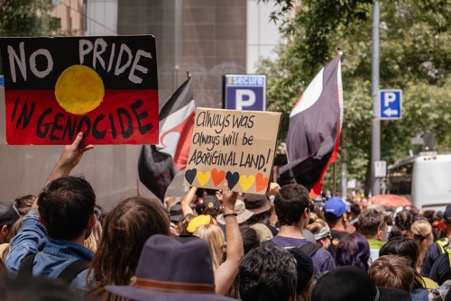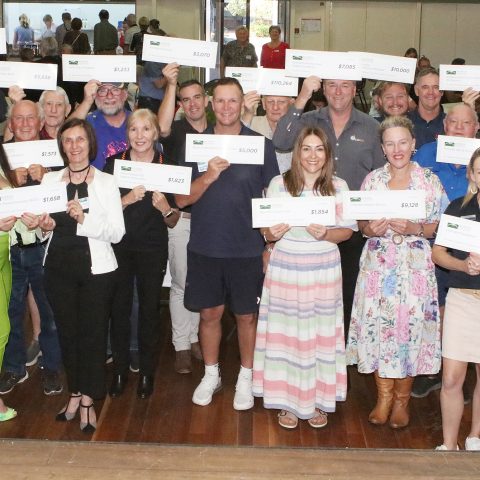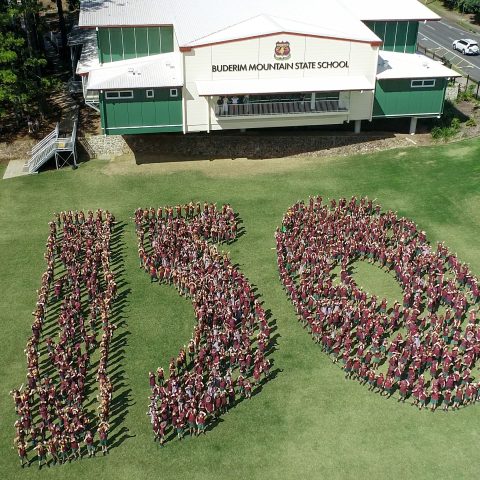Our PR Director, Michelle Smytheman, is passionate about helping emerging professionals in the communications industry and teaches at the University of the Sunshine Coast. As part of an assessment task this year, there have been some excellent blogs written by first-year students about emerging business trends. We are proud to share their work.
By Lea Wickremeratne
 Reconciliation describes a growing movement within the Australian cultural and political macroenvironment, that involves repairing relationships between non-Indigenous and Indigenous Australian communities and building a shared future with mutual goals in mind to benefit all Australians. This movement has been gaining traction over recent years,(1) (2) especially with the proposed Indigenous Voice to Parliament. If successfully implemented, the Indigenous Voice would provide a platform for Aboriginal and Torres Strait Islander people to have a say in matters that affect them, including policies and legislation related to small businesses.(3) (4)
Reconciliation describes a growing movement within the Australian cultural and political macroenvironment, that involves repairing relationships between non-Indigenous and Indigenous Australian communities and building a shared future with mutual goals in mind to benefit all Australians. This movement has been gaining traction over recent years,(1) (2) especially with the proposed Indigenous Voice to Parliament. If successfully implemented, the Indigenous Voice would provide a platform for Aboriginal and Torres Strait Islander people to have a say in matters that affect them, including policies and legislation related to small businesses.(3) (4)
What does this mean for business owners and professionals in the marketing sector? Businesses are increasingly recognising the importance of working towards creating a more equitable and inclusive future for Indigenous Australian people. The proposed Indigenous Voice to Parliament highlights the need for greater collaboration and partnership between Indigenous and non-Indigenous businesses and communities, and the importance of taking a proactive role in the reconciliation process. Businesses can demonstrate a commitment to creating a more equitable and inclusive future for all Australians through intentional environmental, economic and social actions. Indeed, sustainable marketing through economically, environmentally and socially responsible practices has been shown to positively impact, customer engagement and sustained purchasing intention, and brand image.(5)
The Australian government has begun to recognize the importance of creating shared value from an economic perspective; an example of this is the Commonwealth Indigenous Procurement Plan implemented in 2015, the purpose of which was to ‘stimulate Indigenous entrepreneurship and business development, providing Indigenous Australians with more opportunities to participate in the economy’.(6) As business professionals, we are in a strategic position to rally behind our fellow Australians by supporting Aboriginal and Torres Strait Islander run businesses, and it is possible that future legislation may provide further support for Indigenous economic growth. Potential opportunities include partnering with Indigenous organisations and businesses, providing employment and training opportunities for Indigenous Australians, and investing in philanthropic initiatives which support Aboriginal and Torres Strait Islander communities.
From an environmental perspective, ‘caring for country’ is a fundamental Indigenous value that emphasizes the importance of maintaining a harmonious relationship with our natural environment. Businesses can engage in sustainable marketing practices by adopting environmentally responsible actions such as reducing waste, conserving natural resources, and reducing greenhouse gas emissions. These actions can help businesses to reduce their environmental impact and promote sustainable development, which is a key goal of sustainable marketing, and not only demonstrates a sense of care and respect for our country but also is in line with the United Nations Sustainable Development Goals (SDGs). Specifically, environmentally sustainable business practices fall under SDGs 12 – Responsible consumption and production, 13 – Climate Action, 14 – Life below water, and 15 – Life on land.(7)
Another key element of sustainable marketing is the dimension of social marketing. Companies need a strong brand image to distinguish themselves from competitors, and cultural considerations play a large role in customer’s perception of an organisation.(8) For example, businesses can provide an inclusive, informed work environment, acknowledge traditional custodians of the land they operate on, support and engage in efforts to educate stakeholders in local history and culture. Additionally, referring to places by their traditional names, acknowledging traditional custodians and employing Indigenous artists when creating marketing material is a more obvious way to demonstrate organisational support for Reconciliation. Now, corporate branding comprises not only the strategic business decisions organisations make to form corporate expression, but also involves stakeholder’s perceived image of a business or brand.(9) Therefore it is vital that any attempts to engage in reconciliation on a social level is not simply superficial, but extends into tangible working relationships with Indigenous individuals, communities and organisations.
If you are interested in exploring what Reconciliation can look like for your business, consider joining the growing number of organisations implementing a Reconciliation Action Plan (RAP).(10) Reconciliation Australia provides some valuable resources on their website and outlines actions businesses and individuals can take to get behind this rising movement.
To summarize, the growing trend of Reconciliation in Australia provides an opportunity for businesses to take a proactive role in creating a more equitable and inclusive society. By embracing sustainable marketing concepts, businesses can contribute to broader environmental, economic and social outcomes and build stronger relationships with Indigenous communities. Now is the time to take a strategic position in Reconciliation in order to establish a sustainable foundation for the future of your business.
References
Abratt, R & Kleyn, N, 2012,, ‘Corporate identity, corporate branding and corporate reputations: Reconciliation and integration’, European Journal of Marketing, vol. 46, no. 7-8, pp. 1048–1063, doi: 10.1108/03090561211230197
Armstrong, G, Denize, S, Volkov, M, Kotler, P, Hoon Ang, S, Love, Doherty, S & van Esch, P 2021, Principles of marketing, 8th edition, Pearson Australia, Melbourne.
Armstrong, L 2014, ‘Reconciliation Action Plans—Creating Shared Value’, Papers on Parliament, viewed 7/05/2023, https://www.aph.gov.au/About_Parliament/Senate/Powers_practice_n_procedures/pops/Papers_on_Parliament_66/Reconciliation_Action_Plans-Creating_Shared_Value
Allam, L 2023, ‘What is the Indigenous voice to parliament, how would it work, and what happens next?’, The Guardian, 19 April, viewed 04/05/2023, https://www.theguardian.com/australia-news/2023/apr/19/what-is-the-indigenous-voice-to-parliament-referendum-question-wording-vote-australia-constitution-change-details-how-would-it-work-what-does-it-mean-explainer
Grattan, M 2022, ‘Politics with Michelle Grattan: Tom Calma on the indigenous voice to parliament’, The Conversation, viewed 03/05/2023, https://theconversation.com/politics-with-michelle-grattan-tom-calma-on-the-indigenous-voice-to-parliament-188164
Gong, Y, Xiao, J, Tang, X, & Li, J, 2023,, ‘How sustainable marketing influences the customer engagement and sustainable purchase intention? The moderating role of corporate social responsibility’, Frontiers in Psychology, vol. 14, pp. 1128686–1128686, doi: 10.3389/fpsyg.2023.1128686
Markham, F, & Sanders, W, 2020, ‘Support for a constitutionally enshrined First Nations Voice to Parliament: Evidence from opinion research since 2017’, Working Paper no. 138/2020, Centre for Aboriginal Economic Policy Research, Australian National University, Canberra, viewed 05/05/2023, https://doi.org/10.25911/5fb398ee9c47d
Reconciliation Australia 2022, Snapshot: The impact of Reconciliation Action Plans in 2022, report, viewed 5/05/2023, https://www.reconciliation.org.au/wp-content/uploads/2023/04/2022-RAP-Impact-report.pdf
Reconciliation Australia, Reconciliation Action Plans – Reconciliation Australia, viewed 07/05/2023, https://www.reconciliation.org.au/reconciliation-action-plans/
Reconciliation Australia, 20 Actions for Reconciliation, viewed 07/05/2023, https://nrw.reconciliation.org.au/actions-for-reconciliation/




